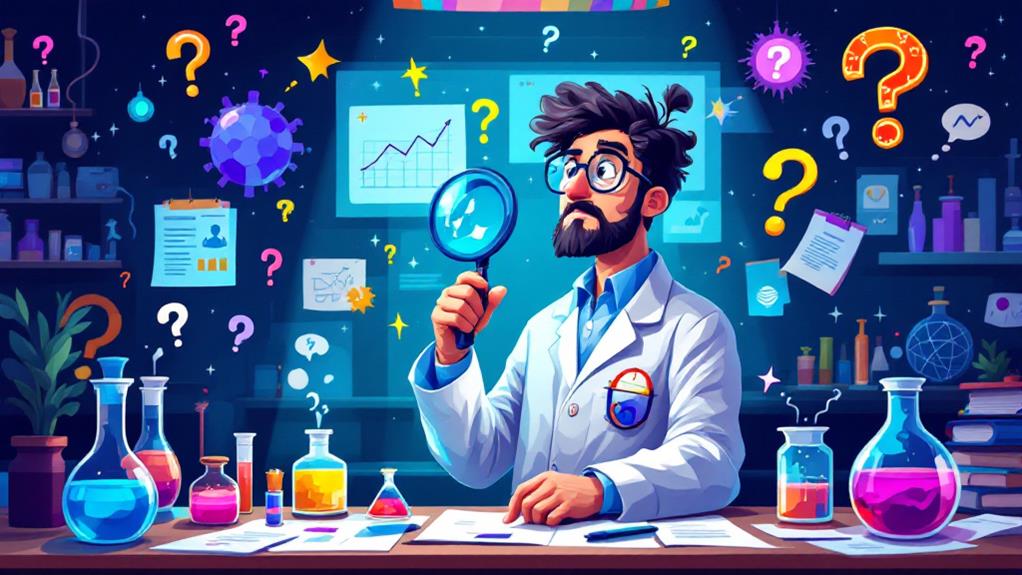What Is the Difference Between Skepticism and Cynicism?

You're probably wondering about the difference between skepticism and cynicism. Skepticism involves questioning and critically evaluating information. It's about maintaining healthy doubt and making rational decisions by analyzing the validity of sources. On the other hand, cynicism assumes that everyone is motivated by selfish interests, leading to distrust and emotional detachment. While skepticism fosters curiosity and understanding, cynicism can isolate you and damage relationships. Recognizing these differences can help you navigate information confidently and build genuine connections. There's a lot more to uncover about how each mindset affects your life and social interactions.
Defining Skepticism
Skepticism is a critical approach that involves questioning and evaluating information rather than accepting it at face value. When you practice skepticism, you engage in critical thinking, which means you don't just take things as they are presented. Instead, you analyze and assess the credibility of the source and the validity of the claims. This process allows you to form well-informed opinions based on evidence and reason. A key component of skepticism is maintaining a healthy doubt. This doesn't mean you reject everything outright, but rather that you consider the possibility that information could be incomplete or flawed. For example, ethical skepticism challenges the basis of moral judgments and customs, prompting you to question societal norms. When you cultivate a healthy doubt, you avoid jumping to deductions and instead seek further evidence or perspectives. This approach empowers you to make more rational decisions and avoid falling prey to misinformation.
Understanding Cynicism

While skepticism welcomes questioning with an open mind, cynicism takes a more negative stance. When you're cynical, you often approach situations with a cynical worldview, assuming that people are motivated by self-interest. It's not just about questioning intentions, but expecting the worst from them. This distrustful attitude can make it hard to form genuine connections with others, as you might constantly doubt their sincerity. In contrast, objectivity in critical thinking allows for neutral analysis, encouraging evaluation of evidence without personal biases. Cynicism can lead to emotional detachment. You might feel like you're protecting yourself from being let down, but this often results in keeping others at arm's length. When you don't allow yourself to emotionally engage, you miss out on the richness of human interaction and the support that comes from trusting relationships. This emotional detachment can contribute to feelings of social isolation, where you feel separate from those around you, even in a group setting.
Your cynical worldview might tell you that this isolation is just a part of life, but recognizing the impact of such a perspective is vital. It's significant to understand that cynicism can become a barrier, keeping you from experiencing the full spectrum of human connection and understanding.
Historical Contexts

Recognizing the impact of a cynical worldview on personal interactions can be enlightening, especially when you consider how cynicism has evolved over time. Cynicism began as one of the ancient philosophies in Greece, founded by Antisthenes, a student of Socrates. It emphasized living in virtue, in agreement with nature, and rejecting conventional desires for wealth, power, and fame. This philosophical movement revolved around simplicity and self-sufficiency, challenging cultural perceptions of what constituted a "successful" life.
As time went on, cynicism transformed. It shifted from a respected school of thought to a mindset often characterized by distrust and skepticism towards others' motives. This evolution of cynicism reflects broader philosophical movements and changes in societal attitudes. While ancient cynics aimed to provoke critical thinking and reflection, today's cynicism often carries a negative connotation, suggesting pessimism and a lack of faith in human goodness.
In modern implications, understanding these roots can help you navigate the fine line between healthy skepticism and destructive cynicism. By recognizing cynicism's historical contexts, you gain insight into how these ancient philosophies continue to shape cultural perceptions and individual attitudes today.
Psychological Impacts

Cynicism can infiltrate your psyche, subtly influencing how you perceive and interact with the world. When you adopt a cynical outlook, it often erodes your emotional resilience. Rather than bouncing back from setbacks, you might find yourself anticipating the worst in people and situations. This mindset can lead to trust issues, as you become increasingly wary of others' intentions, doubting their sincerity and motives. You're not just protecting yourself from potential disappointment; you're also building walls that can prevent genuine connections.
Your perception of the world becomes tainted by negativity, impacting relationships and general well-being. The constant suspicion that others are driven by self-interest makes maintaining healthy relationships challenging. As a result, you might feel isolated, which can perpetuate a cycle of distrust and cynicism. Realize that cynicism isn't just a protective mechanism—it can become a barrier to personal growth and fulfillment.
Building emotional resilience requires acknowledging and addressing these trust issues. By challenging your cynical beliefs, you can gradually open yourself to the idea that not everyone has ulterior motives. This shift can improve your interactions, fostering a more balanced and optimistic view of the world.
Skepticism in Science

Understanding the distinction between cynicism and skepticism can clarify how you engage with the world, especially in scientific contexts. When you approach scientific inquiry, skepticism encourages you to question assumptions and seek evidence. It's not about doubting everything but about applying critical thinking to evaluate claims. By maintaining a healthy skepticism, you guarantee the integrity of your findings and foster innovation.
In science, skepticism is an essential tool. It prompts you to demand evidence and test hypotheses rigorously. This process involves asking questions, examining methodologies, and considering alternative explanations. You remain open to new ideas while requiring that they withstand scrutiny. Critical thinking plays a significant role here, guiding you to differentiate between sound science and unfounded claims.
When you engage in scientific inquiry with skepticism, you contribute to a culture of accountability and progress. You're not dismissing ideas out of hand but rather seeking to understand and verify them. This mindset propels scientific advancement, as it compels you to refine theories and investigate new frontiers. By embracing skepticism, you cultivate a deeper understanding of the world and drive the quest for knowledge forward.
Cynicism in Society

In society, cynicism often manifests as a pervasive distrust in people's motives and institutions. You're surrounded by messages that encourage a skeptical view of the world. This societal cynicism can stem from repeated disappointments, scandals, and misinformation. It trickles down into everyday interactions, shaping how you perceive the world and those around you. Cynicism in media plays a significant role, as news outlets frequently highlight negative stories, reinforcing your doubts and fears. This constant barrage can make it hard to believe in the integrity of any institution or individual.
Consider these manifestations of societal cynicism:
- Politics: You might view politicians as self-serving, believing they prioritize personal gain over public good.
- Corporate Intentions: It's easy to assume companies prioritize profits over people, leading to distrust in their motives and products.
- Media Narratives: With cynicism in media, you might question the truthfulness of news stories, assuming bias or sensationalism.
- Social Interactions: You might find yourself doubting others' honesty, anticipating ulterior motives in even the simplest interactions.
While cynicism can protect you from deception, it can also create barriers, making it difficult to trust and connect with others authentically.
Benefits of Skepticism

Skepticism offers several key benefits that improve your critical thinking and decision-making skills. When you're skeptical, you don't just accept information at face value. Instead, you engage with it, questioning the validity and logic behind claims. This approach helps you develop a strong sense of critical thinking, enabling you to analyze situations objectively and make well-informed decisions. You're less likely to fall for misinformation or be swayed by emotional appeals when you apply a skeptical mindset.
Moreover, skepticism encourages constructive doubt. Constructive doubt isn't about rejecting ideas outright but rather about questioning them in a way that leads to deeper understanding. By practicing skepticism, you learn to evaluate the evidence and consider multiple perspectives before arriving at a resolution. This process not only sharpens your analytical skills but also fosters intellectual humility, as you recognize that no single perspective holds all the answers.
Adopting skepticism also empowers you to challenge assumptions and investigate new possibilities. Rather than accepting the status quo, you become adept at identifying areas for innovation and improvement. This proactive approach can lead to positive changes in both your personal and professional life, enhancing overall development and growth.
Overcoming Cynicism

While skepticism can open doors to knowledge and growth, cynicism often slams them shut. A cynical mindset traps you in a loop of negativity, making it challenging to trust or accept new ideas. Overcoming negativity requires conscious effort and a willingness to change your perspective. Here's how you can start:
- Identify the Source: Recognize the experiences or beliefs fueling your cynicism. Self-reflection helps pinpoint what triggers your negative outlook.
- Practice Gratitude: Shift focus from what's wrong to what's right. Maintain a gratitude journal to remind yourself of positive aspects in your life. This simple practice can gradually lessen the grip of a cynical mindset.
- Surround Yourself with Positivity: Engage with people who inspire and uplift you. Positive influences can change your outlook and counteract negativity by showing you different perspectives.
- Challenge Your Assumptions: Question your negative beliefs. Are they based on facts or assumptions? Re-evaluating your thoughts helps break down unfounded cynicism and replaces it with more balanced, realistic views.



